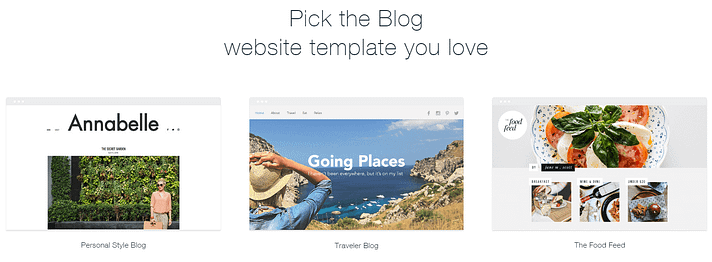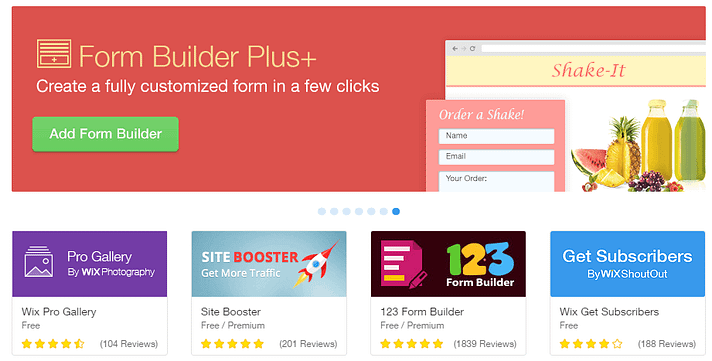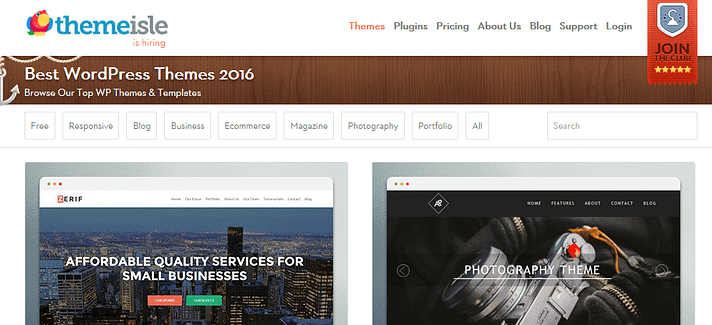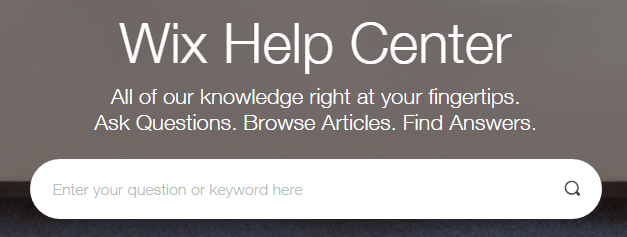Creating a website has never been a task for the faint of heart. Even
the simplest site will require time, money, and know-how to steer it in
the SEO right direction. That’s where Wix vs WordPress come into play.
Or at least, that used to be the case, until website builders and Content Management Systems (CMS) took the web by storm, including the two titular platforms. Wix and WordPress – two very different tools which share one common goal: enabling users to create stunning and usable websites in a simple manner.
In the spirit of healthy competition, we’ll be pitting Wix vs WordPress to measure how they perform against each other in four different categories. In the end only one will remain, so let’s get the fight started!

After making your choice you can begin tinkering with it using Wix’s colorful drag-and-drop editor. You can create new pages using a drop-down menu without leaving the editor, and switch between them in a matter of seconds.

Moving onto WordPress, taking your first steps with the CMS can be a little intimidating, since it doesn’t hold your hand too much. While there are thousands of articles and tutorials covering every simple step of the process – from creating new pages to choosing the right theme – getting to know WordPress’ ins and outs can take a while.
The first round of the Wix vs WordPress fight goes to Wix, which has you up and running in no time at all.
Wix offers its users hundreds of website templates – all of which are fully responsive – and enables them to tinker with the editor to add their personal touches, so that’s a good start.

When it comes to the implementation of advanced features, Wix boasts a catalog of eighty apps that can be added to your site in a matter of seconds. They range from form builders, to reservation systems, and even pricing tables.

WordPress, on the other hand, only offers 15 official themes on its site. That’s pretty disheartening until you realize that there are thousands of third-party themes available on sites like ThemeForest, Elegant Themes, and our very own ThemeIsle.

Moving on, when it comes to plugins, WordPress is second to none. There are over 46,000 plugins available on WordPress.org, and the community shows no signs of slowing down. If you can imagine something, there’s almost certainly a plugin for it.

WordPress, however, places the brunt of securing your website on your shoulders. You need to stay on top of core updates, check for various errors, choose the right host, and handle pretty much everything else yourself.
To some people, this may sound like a lot of responsibility, but it’s mostly common sense. A WordPress website is as secure as its owner makes it.
Furthermore, there are plenty of plugins dedicated solely to keeping your WordPress sites safe, such as WordFence.

WordPress takes the crown again this round. Securing your WordPress site is not that challenging, and you should face no security problems as long as you stay on top of the factors we mentioned. Furthermore, you have the option to make your site as secure as you want it to be.

On the other side of the coin, WordPress doesn’t offer any specialized support aside from its knowledge base. However, entire libraries could be filled with the many articles that have been written on how to perform any imaginable action using the CMS.
What’s more, most plugins and themes receive support from their developers, which is kind of like always having a chef available to answer your questions whenever you’re making a recipe.
This round of Wix vs WordPress is a tie. Finding help for your
particular issues may require a bit of googling with WordPress, but
you’ll be sure to find an answer to just about any inquiry if you look
hard enough.
An area they still need to work on is their loading speed. Despite having improved quite a bit already by adding advanced features such as page caching and better image compression, you are still limited to what the Wix editor allows you to do.
Wordpress, on the other hand, let’s you do whatever you want. Not right out of the gate but if you install the right plugin(s) your SEO options will be limitless. Yoast is a great one but there are also very decent alternatives available.
You also have much better options to crank up your loading speed by choosing your own host and adding plugins to cache and minify your pages.
The final round goes to WordPress again. Even though Wix’s SEO options
are probably more sufficient for beginners, if you are in a very
competitive niche, it’s better to have to full arsenal of tools
available.

Despite ruling for WordPress, we have to say that we’re mightily impressed by how easy it is to use Wix and the many options it provides. If you’re just looking to get an attractive website up and running quickly, then it might just be the right pick for you.
Choosing which platform you’ll use to develop your website is a tough choice to make. Whichever decision you take will come with its own set of pros and cons – but once you’ve taken that first step, the rest of your website designing career can begin at last!
Ultimately, we decided to go with WordPress, but that is not to say that Wix isn’t a viable option – in fact, it’s a great tool for getting simple websites up and running fast, and it offers a lot of plans for different types of users.
Which side are you on when it comes to the Wix vs WordPress debate? Share your reasons with us in the comments section below!
Or at least, that used to be the case, until website builders and Content Management Systems (CMS) took the web by storm, including the two titular platforms. Wix and WordPress – two very different tools which share one common goal: enabling users to create stunning and usable websites in a simple manner.
In the spirit of healthy competition, we’ll be pitting Wix vs WordPress to measure how they perform against each other in four different categories. In the end only one will remain, so let’s get the fight started!
Wix vs WordPress
1. Ease of use
Getting started on Wix is a simple process. Once you’ve signed up, it will ask you what kind of website you want to create, and then it will send you right over to its collection of templates for your chosen category.
After making your choice you can begin tinkering with it using Wix’s colorful drag-and-drop editor. You can create new pages using a drop-down menu without leaving the editor, and switch between them in a matter of seconds.

Moving onto WordPress, taking your first steps with the CMS can be a little intimidating, since it doesn’t hold your hand too much. While there are thousands of articles and tutorials covering every simple step of the process – from creating new pages to choosing the right theme – getting to know WordPress’ ins and outs can take a while.
WordPress 0 : Wix 1
2. Depth of Customization
For this round, we’ll take into consideration two aspects: design customization, and the ability to implement advanced features.Wix offers its users hundreds of website templates – all of which are fully responsive – and enables them to tinker with the editor to add their personal touches, so that’s a good start.

When it comes to the implementation of advanced features, Wix boasts a catalog of eighty apps that can be added to your site in a matter of seconds. They range from form builders, to reservation systems, and even pricing tables.

WordPress, on the other hand, only offers 15 official themes on its site. That’s pretty disheartening until you realize that there are thousands of third-party themes available on sites like ThemeForest, Elegant Themes, and our very own ThemeIsle.

Moving on, when it comes to plugins, WordPress is second to none. There are over 46,000 plugins available on WordPress.org, and the community shows no signs of slowing down. If you can imagine something, there’s almost certainly a plugin for it.

3. Security
Wix and WordPress feature two entirely separate approaches when it comes to security. The first takes it entirely out of your hands – aside from the basics such as choosing a good password and using two-factor authentication – and handles the security aspect of things on their own. You sign up, you pay, and as long as the checks keep clearing, there will be people whose job it is to keep your site safe.WordPress, however, places the brunt of securing your website on your shoulders. You need to stay on top of core updates, check for various errors, choose the right host, and handle pretty much everything else yourself.
To some people, this may sound like a lot of responsibility, but it’s mostly common sense. A WordPress website is as secure as its owner makes it.
Furthermore, there are plenty of plugins dedicated solely to keeping your WordPress sites safe, such as WordFence.

WordPress takes the crown again this round. Securing your WordPress site is not that challenging, and you should face no security problems as long as you stay on top of the factors we mentioned. Furthermore, you have the option to make your site as secure as you want it to be.
4. Support
Wix offers both a robust knowledge base as well as telephone (you can request a callback) and support. The downside of Wix’s support is that they use templated messages quite a lot. So you may have to write them a few times to get your issue resolved if it’s a bit more complex. Response times are usually less than 24 hours, which is acceptable.
On the other side of the coin, WordPress doesn’t offer any specialized support aside from its knowledge base. However, entire libraries could be filled with the many articles that have been written on how to perform any imaginable action using the CMS.
What’s more, most plugins and themes receive support from their developers, which is kind of like always having a chef available to answer your questions whenever you’re making a recipe.
WordPress 3 : Wix 2
5. SEO
Wix hasn’t really got the best reputation for SEO. But rest assured, this comes mainly from Wix’s past when they were still a Flash-based website builder. In 2012 however, they switched to a completely new platform based on HTML5, adding all modern SEO options like customizable URLs as well as page titles and descriptions. They even added 301 redirects and the possibility to add canonical URLs to your pages. You can check this table for a full SEO feature list.An area they still need to work on is their loading speed. Despite having improved quite a bit already by adding advanced features such as page caching and better image compression, you are still limited to what the Wix editor allows you to do.
Wordpress, on the other hand, let’s you do whatever you want. Not right out of the gate but if you install the right plugin(s) your SEO options will be limitless. Yoast is a great one but there are also very decent alternatives available.
You also have much better options to crank up your loading speed by choosing your own host and adding plugins to cache and minify your pages.
WordPress 4 : Wix 2
Wix vs WordPress: Which one should you use?
Ultimately, we have to rule in favor on WordPress when it comes to the Wix vs WordPress debate. Here’s why:- It enables its users to customize every single aspect of their website.
- Despite forcing users to take security into their hands, it provides them with all of the tools to do so.
- There are hundreds if not thousands of articles, tutorials, and videos available for tackling any issues you might encounter.

Despite ruling for WordPress, we have to say that we’re mightily impressed by how easy it is to use Wix and the many options it provides. If you’re just looking to get an attractive website up and running quickly, then it might just be the right pick for you.
Choosing which platform you’ll use to develop your website is a tough choice to make. Whichever decision you take will come with its own set of pros and cons – but once you’ve taken that first step, the rest of your website designing career can begin at last!
Ultimately, we decided to go with WordPress, but that is not to say that Wix isn’t a viable option – in fact, it’s a great tool for getting simple websites up and running fast, and it offers a lot of plans for different types of users.
Which side are you on when it comes to the Wix vs WordPress debate? Share your reasons with us in the comments section below!
No comments:
Post a Comment